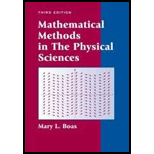
In Problems 11 to 14, parts (a) and (b), you are given in each case one period of a function. Sketch several periods of the function and expand it in a sine-cosine Fourier series, and in a complex exponential Fourier series.
(a)
Want to see the full answer?
Check out a sample textbook solution
Chapter 7 Solutions
Mathematical Methods in the Physical Sciences
Additional Math Textbook Solutions
Calculus: Early Transcendentals (2nd Edition)
Introductory Statistics
Thinking Mathematically (6th Edition)
Pre-Algebra Student Edition
STATISTICS F/BUSINESS+ECONOMICS-TEXT
- Compute (7^ (25)) mod 11 via the algorithm for modular exponentiation.arrow_forwardProve that the sum of the degrees in the interior angles of any convex polygon with n ≥ 3 sides is (n − 2) · 180. For the base case, you must prove that a triangle has angles summing to 180 degrees. You are permitted to use thefact when two parallel lines are cut by a transversal that corresponding angles are equal.arrow_forwardAnswer the following questions about rational and irrational numbers.1. Prove or disprove: If a and b are rational numbers then a^b is rational.2. Prove or disprove: If a and b are irrational numbers then a^b is irrational.arrow_forward
- Prove the following using structural induction: For any rooted binary tree T the number of vertices |T| in T satisfies the inequality |T| ≤ (2^ (height(T)+1)) − 1.arrow_forward(a) Prove that if p is a prime number and p|k^2 for some integer k then p|k.(b) Using Part (a), prove or disprove: √3 ∈ Q.arrow_forwardProvide a context-free grammar for the language {a^ (i) b^ (j) c^ (k) | i, j, k ∈ N, i = j or i = k}. Briefly explain (no formal proof needed) why your context-free grammar is correct and show that it produces the word aaabbccc.arrow_forward
- The Martinezes are planning to refinance their home. The outstanding balance on their original loan is $150,000. Their finance company has offered them two options. (Assume there are no additional finance charges. Round your answers to the nearest cent.) Option A: A fixed-rate mortgage at an interest rate of 4.5%/year compounded monthly, payable over a 30-year period in 360 equal monthly installments.Option B: A fixed-rate mortgage at an interest rate of 4.25%/year compounded monthly, payable over a 12-year period in 144 equal monthly installments. (a) Find the monthly payment required to amortize each of these loans over the life of the loan. option A $ option B $ (b) How much interest would the Martinezes save if they chose the 12-year mortgage instead of the 30-year mortgage?arrow_forwardThe Martinezes are planning to refinance their home. The outstanding balance on their original loan is $150,000. Their finance company has offered them two options. (Assume there are no additional finance charges. Round your answers to the nearest cent.) Option A: A fixed-rate mortgage at an interest rate of 4.5%/year compounded monthly, payable over a 30-year period in 360 equal monthly installments.Option B: A fixed-rate mortgage at an interest rate of 4.25%/year compounded monthly, payable over a 12-year period in 144 equal monthly installments. (a) Find the monthly payment required to amortize each of these loans over the life of the loan. option A $ option B $ (b) How much interest would the Martinezes save if they chose the 12-year mortgage instead of the 30-year mortgage?arrow_forwardGiven: Circle J 2 What is the value of y? A. 38 C. 68 B. 50 D. 92arrow_forward
- please find the answers for the yellows boxes using the information and the picture belowarrow_forwardConsider the function f(x) = x²-1. (a) Find the instantaneous rate of change of f(x) at x=1 using the definition of the derivative. Show all your steps clearly. (b) Sketch the graph of f(x) around x = 1. Draw the secant line passing through the points on the graph where x 1 and x-> 1+h (for a small positive value of h, illustrate conceptually). Then, draw the tangent line to the graph at x=1. Explain how the slope of the tangent line relates to the value you found in part (a). (c) In a few sentences, explain what the instantaneous rate of change of f(x) at x = 1 represents in the context of the graph of f(x). How does the rate of change of this function vary at different points?arrow_forward1. The graph of ƒ is given. Use the graph to evaluate each of the following values. If a value does not exist, state that fact. и (a) f'(-5) (b) f'(-3) (c) f'(0) (d) f'(5) 2. Find an equation of the tangent line to the graph of y = g(x) at x = 5 if g(5) = −3 and g'(5) = 4. - 3. If an equation of the tangent line to the graph of y = f(x) at the point where x 2 is y = 4x — 5, find ƒ(2) and f'(2).arrow_forward
- Algebra & Trigonometry with Analytic GeometryAlgebraISBN:9781133382119Author:SwokowskiPublisher:Cengage
 Linear Algebra: A Modern IntroductionAlgebraISBN:9781285463247Author:David PoolePublisher:Cengage Learning
Linear Algebra: A Modern IntroductionAlgebraISBN:9781285463247Author:David PoolePublisher:Cengage Learning

